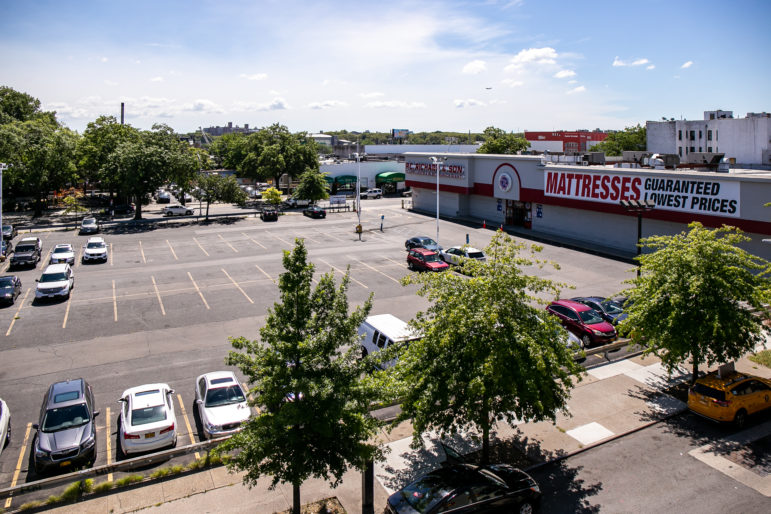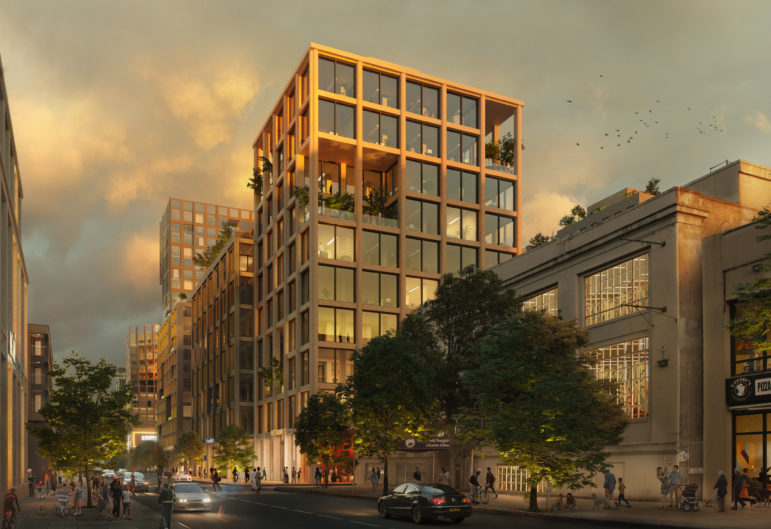Innovation QNS has emerged as the latest flashpoint in a debate over housing production, with supporters saying the plan will provide much-needed units for New Yorkers of all income levels, while opponents say it includes too few income-restricted units for low- and middle-income residents.

Adi Talwar
Looking Southeast from 38th Street in Astoria, part of the area that would be developed under the Innovation QNS plan.The New York City Planning Commission on Wednesday approved an application to rezone five commercial blocks in Southern Astoria to make way for a 2,845-unit housing complex, sending the proposal to the City Council where it faces an uncertain future.
The proposal, known as Innovation QNS, would replace an active industrial zone with about a dozen towers offering residential and commercial space—essentially creating a new sub-neighborhood on the edge of Astoria and Long Island City. The Planning Commission (CPC) voted 10-3 in favor of the plan, despite concerns among the local community board, councilmember and Queens borough president who say the project features too few income-restricted units. Under the current proposal, about a quarter of the apartments will have rents capped for low- and middle-income earners.
Innovation Queens has emerged as the latest flashpoint in a debate over apartment production amid New York’s housing shortage, with project supporters—including 10 CPC commissioners—saying New York City desperately needs new units for all income levels. Opponents of this specific proposal say its approval should hinge on the developers adding more truly affordable units to a lower-income section of Astoria than the plan puts forth.
The current proposal includes about 700 income-capped units under the city’s Mandatory Inclusionary Housing rules, with about 300 priced below $1,000 a month, the developers say. The proposed rezoning is three times larger than the One45 project, a planned development on West 145th Street that the developer pulled in the face of opposition from the local councilmember over affordability and other concerns.
Councilmember Julie Won, who represents Astoria, has repeatedly criticized the Innovation QNS proposal as offering too few units marked “affordable” to low- and middle-income renters. She also cited a lack of community engagement by the trio of developers behind the project before they submitted their rezoning application.
Last month, Won told City Limits it might be “too late” for the developers—a team consisting of Kaufman Astoria Studios, Silverstein Properties and BedRock Real Estate Partners—to revise the proposal to meet local community needs and adhere to a package of land use principles she laid out.
Her stance will likely decide the project’s ultimate fate because the full Council typically defers to local members on land use issues in their district.
Won doubled down on her skepticism of the project at a panel organized by the Association for Neighborhood and Housing Development earlier this month inside the Museum of Moving Image—a property owned by Kaufman Astoria and located across the street from the Innovation QNS rezoning area.
“Of course, we all want to say, ‘Yes.’ We need more housing, but it’s, ‘What kind of housing? How affordable is this housing? Who is the community-based agreement for?’” Won said. “Who is actually benefiting?”
She criticized the CPC’s practice of “rubber-stamping” any proposal that comes before it and likened Innovation QNS to the Amazon campus proposal “done in a backroom” before being unveiled to the public. That project immediately encountered fierce, local opposition before Amazon famously pulled the plan.
Won said the Council’s tradition of “member deference” was crucial for blocking projects or extracting deeper affordability from private developers. On the flip side, she said the tradition allowed councilmembers to hold up development that would benefit communities and the overall city based on the “Not In My Backyard” attitude of vocal constituents.
During the vote Wednesday, three CPC commissioners echoed Won’s concerns over affordability and “secondary displacement”—a concept, challenged by recent research, that nearby rents rise in the wake of market-rate housing development.
“The reason for there being homelessness in the city is because of a lack of affordable housing,” said Commissioner Leah Goodridge, one of the no votes. “Not because there aren’t enough luxury apartments available.”
But CPC Chair Dan Garodnick said the roughly 700 income-restricted apartments in the proposal are no drop in the bucket for a city in need. New York City’s residential development has failed to keep pace with population growth, with less than 0.2 units added to the city’s housing stock for every new job created between 2010 and 2018, according to the Citizens Budget Commission, which recently issued another report condemning the pace and expense of the city’s land use process. New York City’s overall apartment vacancy rate for apartments priced below $1,500 is less than 1 percent, according to the city’s latest housing survey.

Courtesy of the developers
A rendering of the “Innovation QNS” proposal, which would erect at least a dozen towers containing offices, retail space and 2,845 apartments along a five-block stretch of Astoria.The Department of Housing, Preservation and Development (HPD) financed the creation and preservation of just 16,042 affordable units in the most recent fiscal year that ended in June, down 45 percent from the year before and short of the city’s target of 25,000 units, the Mayor’s Management Report shows.
Innovation QNS would not require city funds, supporters note. “The affordable housing component of this project, that would be created without public subsidy, would be considered the largest privately financed affordable housing project in Queens in generations,” Garodnick said. “At a time when our housing crisis is more pronounced than ever, that is a big opportunity.”
Following the vote, Kaufman Astoria Studios Vice President Tracy Capune said the project was crucial for addressing New York housing shortage.
“The need for affordable homes; family-sustaining jobs; public open space; and expanded services for immigrants, seniors and young people has never been greater,” Capune said in a statement. “Today’s overwhelming approval of Innovation QNS by the City Planning Commission is an important step toward delivering all of that and more for our neighbors in Astoria.”
In one concession to community concerns, the developers decided to pull applications for two special permits that would allow for big box retail over 10,000 square feet after residents said such stores would squeeze small businesses along Steinway Street. Three other special permits, allowing for a new supermarket and the relocation of an existing movie theater and a PC Richard & Son, remain part of the proposal.
The debate over the sweeping residential project in a southern stretch of Astoria continues even as a concurrent housing plan in the northern portion of the neighborhood earned the backing of Councilmember Tiffany Cabán last week.
At a press conference on Sept. 12, Cabán explained her decision to vote for a rezoning that would pave the way for developers to erect three towers with roughly 1,300 units on vacant lots in Hallets Cove. That project, known as Hallets North, would also cap rents in about a quarter of its units, with 10 percent priced for people earning less than 30 percent of the Area Median Income—about $36,000 for a family of three and $28,000 for a single person.
The stance by Cabán, a member of the Democratic Socialists of America, contrasted the views of many progressives and socialists when it comes to new housing development that only features a fraction of income-restricted apartments. The decision also touched off debates on the left about support for new housing that enriches private developers without a sizeable number of low-cost units in return.
But for Cabán, the Hallets North vote was based on pragmatism and “harm reduction.”
Without a rezoning, she said, “the best we can hope for without rezoning is a ‘last mile’ facility where some massive corporation like Amazon would pay our neighbors garbage wages for non-stop, back-breaking work that would clog our neighborhood streets with dangerous, pollution-heavy delivery vehicles. If that’s better than a trash-heap, it isn’t by much.”
Cabán said her support was a bridge to truly equitable development and outlined 10 principles for new housing that would benefit people of all income levels. The plan highlights legislation giving community land trusts and other community-based developers the first crack at buying city and privately-owned land, easing the use of rental assistance vouchers and building social housing—publicly owned, mixed-income apartments, where rents are based on a percentage of the tenants’ income.
“Even though I know it is the right choice for today, damn it, I want better choices tomorrow,” Cabán said.









One thought on “City Planning Approves Innovation QNS Rezoning, Sending Plan to a Council Vote”
Great, so all of the community board meetings and the borough pres. decision were a waste of time and was all for optics. Disgraceful.